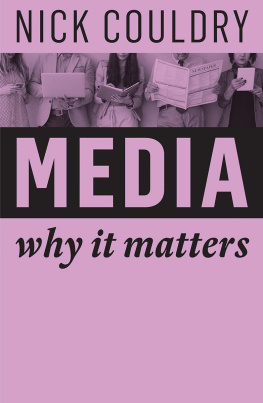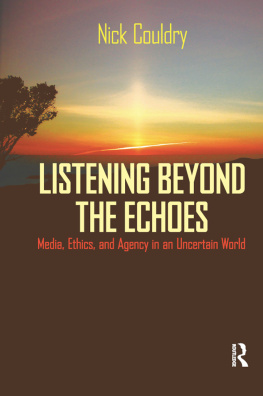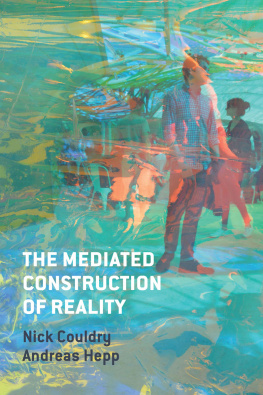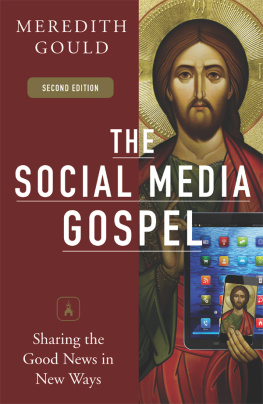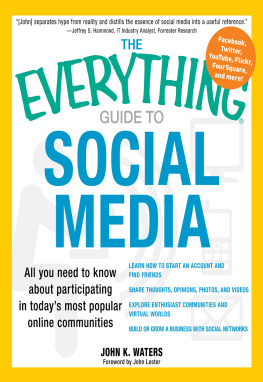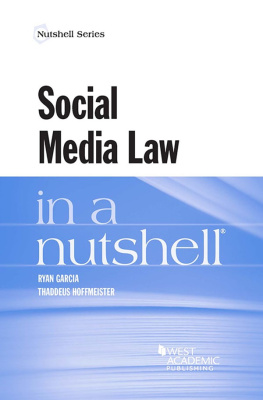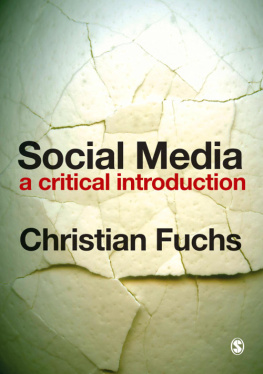
Politys Why It Matters series
In these short and lively books, world-leading thinkers make the case for the importance of their subjects and aim to inspire a new generation of students.
Helen Beebee & Michael Rush, Philosophy
Nick Couldry, Media
Robert Eaglestone, Literature
Andrew Gamble, Politics
Lynn Hunt, History
Tim Ingold, Anthropology
Neville Morley, Classics
Alexander B. Murphy, Geography
Geoffrey K. Pullum, Linguistics
Graham Ward, Theology and Religion
Media
Why It Matters
Nick Couldry
polity
Copyright Nick Couldry 2020
The right of Nick Couldry to be identified as Author of this Work has been asserted in accordance with the UK Copyright, Designs and Patents Act 1988.
First published in 2020 by Polity Press
Polity Press
65 Bridge Street
Cambridge CB2 1UR, UK
Polity Press
101 Station Landing
Suite 300
Medford, MA 02155, USA
All rights reserved. Except for the quotation of short passages for the purpose of criticism and review, no part of this publication may be reproduced, stored in a retrieval system or transmitted, in any form or by any means, electronic, mechanical, photocopying, recording or otherwise, without the prior permission of the publisher.
ISBN-13: 978-1-5095-1518-9
A catalogue record for this book is available from the British Library.
Library of Congress Cataloging-in-Publication Data
Names: Couldry, Nick, author.
Title: Media : why it matters / Nick Couldry.
Description: Cambridge, UK ; Medford, MA : Polity, 2019. | Series: Why it matters | Includes bibliographical references. | Summary: The media plays a massive role in shaping the world as we see it. Couldry explains the significance of five core dimensions of media, and shows that understanding these dynamics is a vital skill that every person needs in the digital age, when the fate of our political worlds and social environment may rest on how we communicate with each other-- Provided by publisher.
Identifiers: LCCN 2019020466 (print) | LCCN 2019981525 (ebook) | ISBN 9781509515141 (hardback) | ISBN 9781509515158 (paperback) | ISBN 9781509515189 (epub)
Subjects: LCSH: Mass media.
Classification: LCC P90 .C689 2019 (print) | LCC P90 (ebook) | DDC 302.23--dc23
LC record available at https://lccn.loc.gov/2019020466
LC ebook record available at https://lccn.loc.gov/2019981525
The publisher has used its best endeavours to ensure that the URLs for external websites referred to in this book are correct and active at the time of going to press. However, the publisher has no responsibility for the websites and can make no guarantee that a site will remain live or that the content is or will remain appropriate.
Every effort has been made to trace all copyright holders, but if any have been overlooked the publisher will be pleased to include any necessary credits in any subsequent reprint or edition.
For further information on Polity, visit our website: politybooks.com
Dedication
To Chris, Imogen, and Will
Acknowledgements
This book was written between June 2018 and June 2019, in a period of considerable turbulence and rising controversy in media, politics and society in Brazil, Hungary, India, the UK, the USA, Venezuela, and many other places. Rather than bracket out that context, I have tried to reflect it.
Thanks to Pascal Porcheron of Polity for his invitation in 2016 to write a book in Politys Why It Matters series, his patience with a slower schedule than originally planned, and his perceptive editorial input. Thanks to Ellen MacDonald-Kramer for her support too and to Justin Dyer for a sharp and sensitive copy-edit of the manuscript.
I also want to thank various institutions and people without whom the book, once committed, could never have been written or completed. In terms of institutions, thanks to the Department of Media and Communications at the London School of Economics and Political Science, which granted the sabbatical during which this book was written; and thanks to the Berkman Klein Center for Internet and Society at Harvard University and MITs Comparative Media Studies programme for being congenial homes in autumn 2018. Turning to people, particular thanks to my niece Isobel Edwards for carefully reading an earlier draft and reassuring me that I had made at least some progress in shedding the jargon and unnecessary detail that often gets in the way of academic writing. And thanks to Yongchan Kim for advice about media in Korean history; to Kim Schrder for alerting me to the original version of the Stuart Hall research paper discussed in ; and to Sonia Livingstone and Rafa Zaborowski for conversations over a number of years about the media deprivation exercise as performed in their Media Audiences course at the LSE. Many thanks also to Joo Vieira-Magalhes for research assistance and, as ever, excellent help on many matters of detail. Thanks to three anonymous reviewers for Polity for helpful and constructive comments that helped me to produce a better version. And heartfelt thanks to Louise Edwards not just for commenting on the manuscript, but even more importantly for tolerating my frequent distractions and absences during much of this books writing and for her clarity, as always, in grasping what really matters. The faults that remain are my responsibility.
I dedicate this book to Chris Powell, Imogen Crarer, and Will Crarer. In their world, media will surely matter even more than in mine whether for good or ill, we must wait and see.
Nick Couldry
Islip, near Oxford
June 2019
Introduction
Imagine your life without media.
This is a standard exercise in media classes, but its hard to put into practice, even for a day. Its a little like being forced to navigate across a room completely blindfolded. And yet imagining your daily routine without media involves more than just imagining the lack of a sense. It means imagining a world that is, like ours, organized around media and the assumption we all have access to media, where suddenly you dont hold the resource of media in your hand.
What makes the media deprivation exercise hard is the act of social imagination it requires. We have become used to organizing social life and wider society through what we do with media. Operating on a different basis, even for a day, requires us to imagine the routines of a society different from the one we live in.
The difficulty of sustaining the media deprivation exercise is an example of a problem identified sixty years ago by the biologist Gregory Bateson. Bateson called this the double bind: even if we choose not to communicate, we end up communicating something, just by that abstinence. In a similar way, even withdrawing from all our systems for communicating through media sends a message. Thats why students doing the media deprivation exercise often have to stop: their parents are anxiously calling round to ask whats wrong with them. It is as if, by not communicating, they were sending a message.
Media matter in our world, and in a particular way. Having access to certain information flows according to particular rhythms matters for whether contemporary societies are characterized by order or chaos; it affects what sort of social order is possible. These are flows not just of information, but maybe of other resources too: visibility, the possibility to connect, and some control over what images and information reach us. Social order depends today on a media order, which makes certain demands of us: the requirement to be connected and to follow what our networks are doing; the requirement to be tracked by platforms.
Next page
